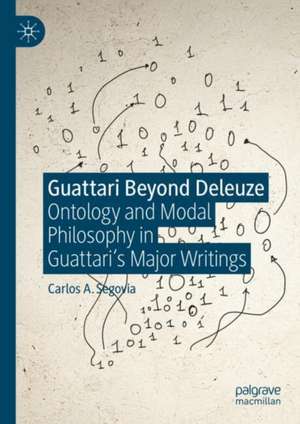Guattari Beyond Deleuze: Ontology and Modal Philosophy in Guattari's Major Writings
Autor Carlos A. Segoviaen Limba Engleză Hardback – 11 dec 2024
Preț: 891.96 lei
Preț vechi: 1087.76 lei
-18% Nou
Puncte Express: 1338
Preț estimativ în valută:
170.68€ • 185.98$ • 143.82£
170.68€ • 185.98$ • 143.82£
Carte disponibilă
Livrare economică 02-16 aprilie
Preluare comenzi: 021 569.72.76
Specificații
ISBN-13: 9783031696497
ISBN-10: 3031696492
Pagini: 304
Ilustrații: Approx. 305 p. 10 illus.
Dimensiuni: 148 x 210 mm
Greutate: 0.47 kg
Ediția:2025
Editura: Springer Nature Switzerland
Colecția Palgrave Macmillan
Locul publicării:Cham, Switzerland
ISBN-10: 3031696492
Pagini: 304
Ilustrații: Approx. 305 p. 10 illus.
Dimensiuni: 148 x 210 mm
Greutate: 0.47 kg
Ediția:2025
Editura: Springer Nature Switzerland
Colecția Palgrave Macmillan
Locul publicării:Cham, Switzerland
Cuprins
Preface. Why This Book?.- Chapter 1. Guattari’s Philosophy and the Being of the Possible: From Psychoanalysis and Transversality to Schizoanalytic Cartographies.- Chapter 2. Between Ethnography and Psychoanalysis: Guattari vis-à-vis Clastres and Sebag.- Chapter 3. From Deterritorialization to Determinability: Guattari’s Chaosmic Ontology in Schizoanalytic Cartographies and His Unpublished Notes for What Is Philosophy?.- Chapter 4. Guattari beyond Deleuze: On Being, Time, Subjectivity, and Openness.- Chapter 5. Rereading Guattari Today: From Indeterminacy and Acceleration to Worlding, from Anti-psychiatry to Enactive Psychiatry, from Hysteria to Animism.- Chapter 6. Conclusion. Guattari’s Philosophical (Un)timeliness.
Notă biografică
Carlos A. Segovia is a British-born Spanish philosopher working on post-nihilism and comparative ontologies. He teaches philosophy at Saint Louis University, Madrid Campus. Among his publications, Dionysus and Apollo after Nihilism: Rethinking the Earth–World Divide (with Sofya Shaikut, 2023) and Félix Guattari and the Ancients: Theatrical Dialogues in Early Philosophy (with Gary Genosko, 2024).
Textul de pe ultima copertă
This book argues that, by virtue of his original and ongoing contribution to ontology and modal philosophy (from the texts gathered in Psychanalysis and Transversality to the unpublished manuscript notes for What Is Philosophy?), Guattari is to be acknowledged a philosopher in his own right, independently from Deleuze. Furthermore, it looks back and forth beyond Anti-Oedipus and contends that Guattari’s major writings gradually supplement deterritorialization with determinability. Accordingly, it offers a new interpretation of the nuanced development of Guattari’s philosophical thought, which it proposes to define as constructivist, rather than post-structuralist. Additionally, it explores the innovative responses that Guattari’s philosophy supplies to various contemporary philosophical debates like those on accelerationism, indeterminacy, compossibility, and worlding. Finally, it examines the differences that, upon a careful cross-reading of their earliest texts (including The Anti-Oedipus Papers and Difference and Repetition), must be drawn between Guattari’s constructivism and Deleuze’s sacrificial philosophy.
Carlos A. Segovia is a British-born Spanish philosopher working on post-nihilism and comparative ontologies. He teaches philosophy at Saint Louis University, Madrid Campus. Among his publications, Dionysus and Apollo after Nihilism: Rethinking the Earth–World Divide (with Sofya Shaikut, 2023) and Félix Guattari and the Ancients: Theatrical Dialogues in Early Philosophy (with Gary Genosko, 2024).
Carlos A. Segovia is a British-born Spanish philosopher working on post-nihilism and comparative ontologies. He teaches philosophy at Saint Louis University, Madrid Campus. Among his publications, Dionysus and Apollo after Nihilism: Rethinking the Earth–World Divide (with Sofya Shaikut, 2023) and Félix Guattari and the Ancients: Theatrical Dialogues in Early Philosophy (with Gary Genosko, 2024).
Caracteristici
Evaluates Guattari’s philosophical thought independently from Deleuze’s Analyzes Guattari’s shift in focus from deterritorialization to determinability Contrasts Guattari’s philosophy with both speculative realism and new materialism
